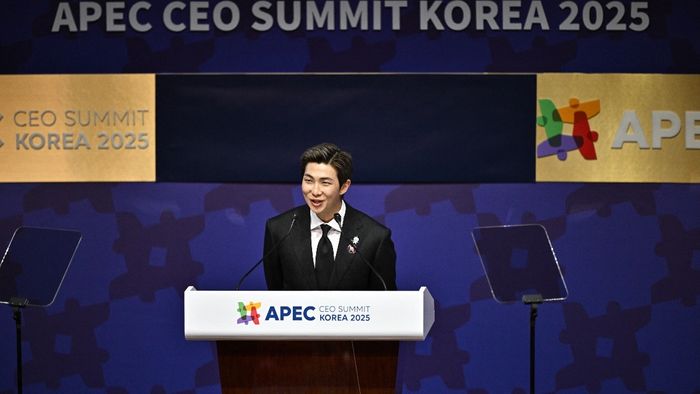BTS's Namjoon proves once again why he's industry's go-to voice for global diplomacy
BTS leader RM took centre stage at the APEC CEO Summit in Gyeongju, South Korea, on October 29, delivering a keynote address that reinforced his position as not just a K-pop idol, but as the defining voice of an entire generation and industry.

- Oct 30, 2025,
- Updated Oct 30, 2025, 2:33 PM IST
BTS leader RM took centre stage at the APEC CEO Summit in Gyeongju, South Korea, on October 29, delivering a keynote address that reinforced his position as not just a K-pop idol, but as the defining voice of an entire generation and industry.
Speaking at the summit's cultural session on "Cultural and creative industries in the APEC region and the soft power of K-culture," the rapper-turned-cultural diplomat demonstrated exactly why he's become the face BTS—and frankly, all of K-pop—sends when the world's biggest stages come calling.
This wasn't RM's first rodeo with heavyweight audiences. The 30-year-old has already delivered addresses at the United Nations (twice, actually), the Billboard Music Awards, the Grammys, and even the White House. When K-pop needs a spokesperson who can articulate its impact beyond streaming numbers and fan chants, there's really only one choice.
RM didn't sugarcoat the group's journey during his speech. He painted a vivid picture of BTS's early struggles breaking into international markets a decade ago—a time when hearing non-English music on Western radio was practically unheard of.
"We danced in the streets. We handed out flyers to free shows," RM recalled. "But there was something even more difficult than those. When we said, 'We are artists from Korea,' they didn't ask us about our music. They asked, 'Are you from North Korea or South Korea?' 'Where on Earth is Korea?'"
The leader explained how the group had to introduce their home country's geography before they could even discuss their artistry—a reality that makes their current global dominance all the more remarkable.
Leave it to RM to make cultural analysis both accessible and memorable. The BTS leader compared K-pop to bibimbap, Korea's iconic mixed rice dish, in what might be the most digestible explanation of the genre's appeal yet.
"You take 'bap,' which is rice. Then you put all kinds of vegetables, meat and flavourings on top, and mix it all up," he explained. "K-pop is much the same. You take Korea's unique aesthetics, emotions and production system. But you don't turn away elements of Western music, like hip-hop, R&B and EDM."
His point? K-pop's explosive success stems from respecting diversity while maintaining Korean identity—not from cultural superiority. "K-pop's success didn't happen because one single culture was better," RM emphasised. "K-pop's success came from respecting diversity and embracing world cultures, but still holding onto Korea's unique identity."
RM reserved special acknowledgement for ARMY, BTS's devoted fandom, crediting them as the true barrier-breakers. He noted with characteristic humour that ARMY is both the name of BTS's official fandom and where he "just finished my military service" for 18 months—"just wanted to make sure" everyone understood the distinction.
"ARMY's support and passion crossed all borders and opened up brand new paths for me," he told the assembled business leaders. "They gave me a voice that was heard at the Billboard Music Awards, at the Grammys, at the United Nations and even at the White House."
But ARMY's impact extended beyond simply boosting BTS's profile. RM described how fans transformed from "supporters of a minority culture from Asia" into a global community that now "shakes the world" through charity work, social campaigns, and borderless cultural solidarity.
RM used his platform to make a direct appeal to the APEC leaders in attendance: invest in creators. Not just as an economic strategy, but as a force for global understanding.
"Please help them. Give them the financial support so that their own creativity can bloom. Give them the opportunities so that their talents can really shine," he urged. "When you think about investing in tomorrow's generations, think about culture as well as economics."
It was a bold ask, delivered with the confidence of someone who's already proven culture's economic and diplomatic power. After all, BTS's impact on South Korea's economy and global soft power is well-documented—RM was simply asking leaders to replicate that success story worldwide.
What sets RM apart isn't just his English fluency or his thoughtful approach to complex topics. It's his ability to represent K-pop's journey authentically while articulating its broader significance. He speaks as both insider and analyst, creator and critic, fan and leader.
"I'm not a business leader. I don't think you want to hear any numbers or figures from me," he told the audience early in his speech. "So, today I want to speak to you as a creator and an artist."
That perspective—grounded in artistic integrity rather than corporate speak—is precisely what makes his advocacy so effective. RM doesn't just talk about K-pop's success; he embodies the creative philosophy that made it possible.
As BTS continues its Chapter 2 journey following military service, RM's speech served as a reminder that some roles transcend group activities. When the world wants to understand K-pop, when leaders need cultural insight, when the industry needs a voice that commands respect—they call on Kim Namjoon.
And time after time, he delivers.